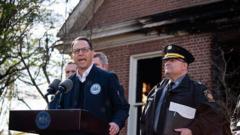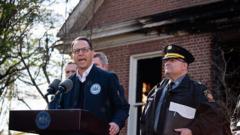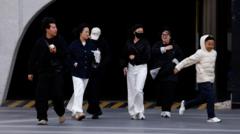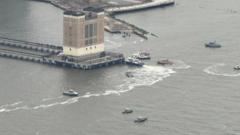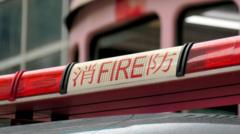As wildfires rage in Los Angeles, a misfired emergency alert warning of evacuation has left many residents confused and frustrated, sparking concerns over the region's emergency preparedness.
**Mass Confusion in LA as Emergency Alert Wrongly Sent to Millions**
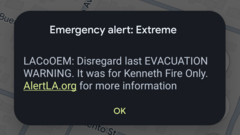
**Mass Confusion in LA as Emergency Alert Wrongly Sent to Millions**
A mistaken evacuation alert sends Los Angeles residents into a panic amid ongoing wildfire threats.
In the midst of raging wildfires in Los Angeles, a panicked alert was mistakenly dispatched to the cell phones of nearly 10 million residents, signaling they should prepare to evacuate. The alarming message surfaced Thursday just as people were grappling with the intense anxiety of the ongoing crisis, which has already tragically claimed the lives of at least ten individuals.
Rebecca Alvarez-Petit, who was on a work call at the time, described the moment the alert blared across her office, creating a palpable tension as her colleagues shared in the disconcerting experience. The urgent message was quickly followed by a retraction, instructing residents to disregard the initial warning. “It felt almost like a cruel joke,” she expressed, reflecting the collective sentiment of residents who had been glued to their devices, desperately seeking updates on the ever-evolving situation.
Mayor Karen Bass, who cut short a trip to Africa to address the fire crisis, faced fierce scrutiny regarding the city's level of preparedness and emergency response. Echoing the frustrations of the community, she acknowledged the shortcomings, especially the water shortages that hampered firefighting efforts. "When lives have been saved and homes have been preserved, we will certainly reevaluate our approach,” she stated, indicating future assessments on handling such disasters.
Residents like Larry Villescas experienced the critical consequences of inadequate water supply firsthand, as they attempted to fend off the advancing flames with only garden hoses. His plea of “if we had water pressure…” reverberated with many who questioned the systemic issues behind such a calamity. Experts have suggested that the dynamics of the current disaster led to an extraordinary demand for water, exposing flaws in the urban system’s capability to support firefighting efforts.
Adding to the narrative of frustration, neighbors relayed their belief that infrastructure improvements had long been deferred, leaving communities vulnerable in times of dire need. As losses mount and recovery becomes increasingly complicated, calls for clarity on emergency services and infrastructure integrity resonate louder than ever, as the community grapples with not only the loss of homes but also the palpable sense of betrayal from systems meant to protect them.
The struggle continues amidst the chaotic backdrop of wildfires threatening vast areas, leaving millions in Southern California questioning the effectiveness of the crisis management and readiness for future emergencies.
Rebecca Alvarez-Petit, who was on a work call at the time, described the moment the alert blared across her office, creating a palpable tension as her colleagues shared in the disconcerting experience. The urgent message was quickly followed by a retraction, instructing residents to disregard the initial warning. “It felt almost like a cruel joke,” she expressed, reflecting the collective sentiment of residents who had been glued to their devices, desperately seeking updates on the ever-evolving situation.
Mayor Karen Bass, who cut short a trip to Africa to address the fire crisis, faced fierce scrutiny regarding the city's level of preparedness and emergency response. Echoing the frustrations of the community, she acknowledged the shortcomings, especially the water shortages that hampered firefighting efforts. "When lives have been saved and homes have been preserved, we will certainly reevaluate our approach,” she stated, indicating future assessments on handling such disasters.
Residents like Larry Villescas experienced the critical consequences of inadequate water supply firsthand, as they attempted to fend off the advancing flames with only garden hoses. His plea of “if we had water pressure…” reverberated with many who questioned the systemic issues behind such a calamity. Experts have suggested that the dynamics of the current disaster led to an extraordinary demand for water, exposing flaws in the urban system’s capability to support firefighting efforts.
Adding to the narrative of frustration, neighbors relayed their belief that infrastructure improvements had long been deferred, leaving communities vulnerable in times of dire need. As losses mount and recovery becomes increasingly complicated, calls for clarity on emergency services and infrastructure integrity resonate louder than ever, as the community grapples with not only the loss of homes but also the palpable sense of betrayal from systems meant to protect them.
The struggle continues amidst the chaotic backdrop of wildfires threatening vast areas, leaving millions in Southern California questioning the effectiveness of the crisis management and readiness for future emergencies.






